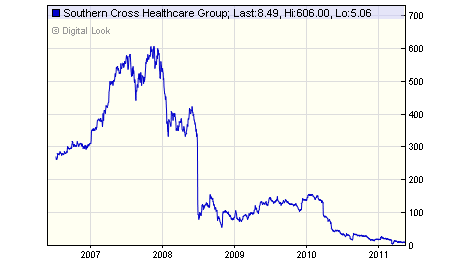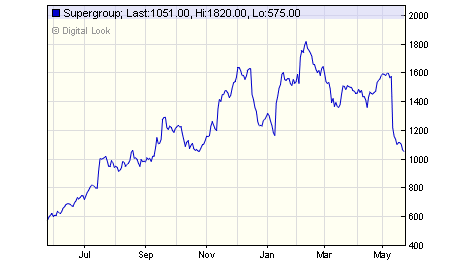How to invest like a Dragon
The millionaires on TV's Dragons' Den look for businesses that have a broad 'economic moat'. But what it is it, and how do you use it to spot a good investment opportunity? Bengt Saelensminde explains, and picks one stock with a real economic moat.
Get the latest financial news, insights and expert analysis from our award-winning MoneyWeek team, to help you understand what really matters when it comes to your finances.
You are now subscribed
Your newsletter sign-up was successful
Want to add more newsletters?

Twice daily
MoneyWeek
Get the latest financial news, insights and expert analysis from our award-winning MoneyWeek team, to help you understand what really matters when it comes to your finances.

Four times a week
Look After My Bills
Sign up to our free money-saving newsletter, filled with the latest news and expert advice to help you find the best tips and deals for managing your bills. Start saving today!
I'm a big fan of Dragons' Den. And I'm really looking forward to its return towards the end of the summer.
I think the show brings to life a key issue investors face every day. It's called: 'the economic moat.' And it's a critical factor in recognising any great investment story.
Every time Duncan Bannatyne recognises the economic moat he grits his teeth and lowers his face to conceal his excitement.
MoneyWeek
Subscribe to MoneyWeek today and get your first six magazine issues absolutely FREE

Sign up to Money Morning
Don't miss the latest investment and personal finances news, market analysis, plus money-saving tips with our free twice-daily newsletter
Don't miss the latest investment and personal finances news, market analysis, plus money-saving tips with our free twice-daily newsletter
Today, I'll show you two stocks that look like they've got very broad economic moats. And how you can use this idea to recognise a serious investment opportunity...
Keeping the enemy at arm's length
Warren Buffett coined the phrase. And it's a great idea. You'll see the dragons probing the would-be entrepreneurs:
"What's your cost advantage?"
"Why's the customer going to come to you?"
"Why's the customer going to keep coming back?"
"Are your patents and property rights water-tight?"
Answer those questions well and you've probably got a dragon onside. As with a castle, the moat is what protects you from your enemies, or competitors in this case.
And those four points are exactly the same for us stock market dragons.
Take this example.
Quite a while ago I looked into a company called Southern Cross. They seemed to have the economic moat sewn up. They provide care homes for the elderly.
The customers were there and in growing numbers. Once in, they weren't likely to want to move away to a competitor. They're big too today they've got over 31,000 residents in 750 homes so there should have been some efficiency of scale.
But there was something about the business that bothered me. They would sell off the care home freeholds to investors and then lease them back. They engineered the deal so that they benefited from cheap rents that increased over time. It looked like there could be trouble ahead.
So I steered clear.
But little did I (or they) know the real battlefield. And that was the local councils, their biggest client.
You see, for all the talk of austerity today, the fact is it's been going on for a while with the local councils. They've had their budgets capped by the government since 2003. The local authorities have had to become hard-nosed negotiators when dealing with service providers.
Southern Cross has seen rents go up, just as local authorities have screwed them down on price.
What looked like a great economic moat was illusory. The stock went from around £6 at its peak and trades under ten pence today.
Five year performance: Southern Cross

The trick is to find two economic moats first on a sector level, for example elderly care, food, clothing, pharmaceuticals or utilities a sector that looks sure to stand the test of time.
The second moat is at a corporate level ie how the individual company has set up its defences
A stock with a real economic moat
To my mind the most important part of the moat is the brand. That's what brings customers through the door and makes them stick with you. A brand enhances profit margins as customers are prepared to pay a little more for the product.
And one of the best brand developers I've seen in recent times is Supergroup. They're always quoted as being "The clothing retailer behind the brand Superdry".
So when you read about them in the papers you'd think that this is a one-trick pony. But that misses what these guys are really about.
Supergroup is a brand developer they've got many more brands than just Superdry and there are more in the pipeline too. And these guys know how to promote new brands too. You can check out their vision in the original prospectus.
I recommended the stock at the IPO (read my orginal argument here). And from what I can see the business has delivered everything that was asked of it- and then some more. I wasn't surprised to see the stock go from £5 to £10 as the market woke up to Supergroup's potential.
Of course stock markets can get a bit heated when there's a new wonder-stock in town. Goldman Sachs put a target of £18 on the shares. And for a while it looked like we were going to hit it.
But recently there have been a couple of small glitches. First they released a warning that cotton prices would hit margins. And then just over a week ago they said that they'd suffered as a result of not getting the right stock into stores as the early summer took them by surprise.
The stock market punished them badly. The market is worried that Supergroup is starting to see sales growth turn around.
But I think the market has misread the corporate moat. The management team are this company's moat. They're a bunch of creatives that know how to launch and build successful brands. And they've only just begun.
They're only just getting started in Europe and the Middle East. And then there's the massive potential of the US market to come.
As you can see from the chart, the shares have backtracked. I think there's great value here. I'd pick up Supergroup for £10 and change.
One year chart: Supergroup

This is a young company. We've already seen some mistakes, and perhaps there'll be more to come. But I think there's a great management team here. One that can build a sustainable moat. So come on you dragons I'd grab them while they're cheap.
This article was first published in the free investment email The Right side. Sign up to The Right Side here.
Important Information
Your capital is at risk when you invest in shares - you can lose some or all of your money, so never risk more than you can afford to lose. Always seek personal advice if you are unsure about the suitability of any investment. Past performance and forecasts are not reliable indicators of future results. Commissions, fees and other charges can reduce returns from investments. Profits from share dealing are a form of income and subject to taxation. Tax treatment depends on individual circumstances and may be subject to change in the future. Please note that there will be no follow up to recommendations in The Right Side.
Managing Editor: Frank Hemsley. The Right Side is issued by MoneyWeek Ltd.
MoneyWeek Ltd is authorised and regulated by the Financial Services Authority. FSA No 509798. https://www.fsa.gov.uk/register/home.do
Get the latest financial news, insights and expert analysis from our award-winning MoneyWeek team, to help you understand what really matters when it comes to your finances.
Bengt graduated from Reading University in 1994 and followed up with a master's degree in business economics.
He started stock market investing at the age of 13, and this eventually led to a job in the City of London in 1995. He started on a bond desk at Cantor Fitzgerald and ended up running a desk at stockbroker's Cazenove.
Bengt left the City in 2000 to start up his own import and beauty products business which he still runs today.
-
 Should you buy an active ETF?
Should you buy an active ETF?ETFs are often mischaracterised as passive products, but they can be a convenient way to add active management to your portfolio
-
 Power up your pension before 5 April – easy ways to save before the tax year end
Power up your pension before 5 April – easy ways to save before the tax year endWith the end of the tax year looming, pension savers currently have a window to review and maximise what’s going into their retirement funds – we look at how